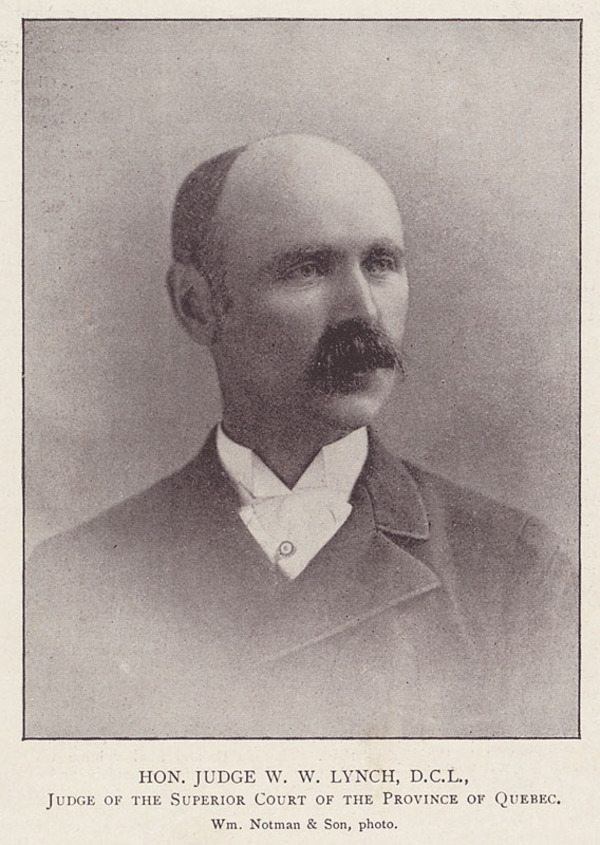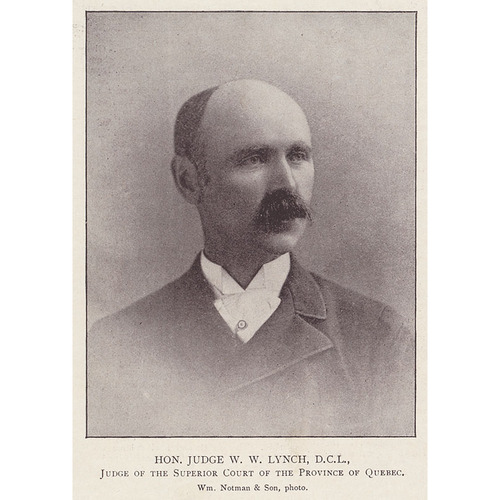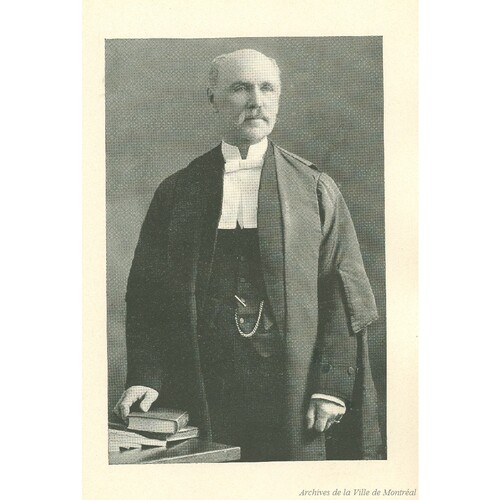
Source: Courtesy of Wikimedia Commons
LYNCH, WILLIAM WARREN, lawyer, politician, and judge; b. 30 Sept. 1845 in Bedford, Lower Canada, son of Thomas Lynch, a farmer, and Charlotte Williams; m. 25 May 1874 Ellen Florence Pettes in Knowlton, Que., and they had two sons; d. there 23 Nov. 1916.
Originally from County Cavan (Republic of Ireland), William Warren Lynch’s father had come to Canada around 1830; his mother was descended from loyalists who had settled in Stukely Township (Que.). William attended Stanbridge Academy and the University of Vermont in Burlington. He received a scholarship from McGill College in 1862, but had to abandon his studies after a couple of months because of poor health; he spent the next few years on the family farm while teaching locally. In 1865 he was admitted to the study of law; after articling, he obtained his bcl from McGill College in May 1868, along with the Elizabeth Torrance Gold Medal for excellence in Roman law.
Called to the bar in June, Lynch settled in Knowlton, where he remained, apart from a few years spent in Sweetsburg, the district town of Bedford. At the time of the Fenian threat in 1866, he had helped form the Brome militia, the Home Guard, with which he took part in the skirmish of Eccles Hill on 25 May 1870 [see John O’Neill*].
Lynch’s strong sense of civic duty led him to become one of the founders in 1870 of the Cowansville Observer, which he edited for several years. He did not campaign in the 1871 provincial election but on 12 June he was elected for Brome by acclamation. In his mid twenties, he was one of the youngest members of the Legislative Assembly, and he was re-elected five times consecutively for the Conservatives in this safe Eastern Townships riding.
When Joseph-Adolphe Chapleau* came to office as premier, he named Lynch solicitor general on 31 Oct. 1879. After the abolition of this position, Lynch served as commissioner of railways from 30 June to 31 July 1882. He became commissioner of crown lands under Joseph-Alfred Mousseau*, who succeeded Chapleau, and he continued to hold the post in the cabinets of John Jones Ross* and Louis-Olivier Taillon*; his resignation was occasioned by the fall of the Taillon government on 29 Jan. 1887. He gave up the seat for Brome on 5 July 1889 because of his appointment as judge of the Superior Court for the district of Bedford.
Lynch had quite an eventful parliamentary career; although he never questioned his loyalty to the Conservatives, despite the ideology of the party’s ultramontanes, he supported Liberal positions on various occasions. On 10 Dec. 1874, for example, he seconded the amendment censuring the Conservative government’s negligence in the Tanneries scandal [see Louis Archambeault*]. When in 1881 Joseph-Israël Tarte* and Honoré Mercier* came to the defence of their colleague George Irvine*, accused of fraudulent dealings in the sale of the Levis and Kennebec Railway, he joined their ranks in solidarity with the other anglophone members. On 9 March 1878, however, he tried unsuccessfully to thwart the so-called coup d’état by Luc Letellier* de Saint-Just which had just brought the Liberal Henri-Gustave Joly* to power. It was Lynch who, with Edmund James Flynn*, would trigger the fall of the Joly government on 29 Oct. 1879.
The member for Brome was involved in several important issues. He effectively supported railways, which were of vital importance to his region, and in 1888 he became vice-president of the Orford Mountain Railway Company. The assembly committee responsible for the development of curriculum in Protestant schools named him an associate in 1876; he had twice been president of the Provincial Association of Protestant Teachers and from 1897 to 1900 he was a member of the Protestant committee of the Council of Public Instruction. He also organized the first fisheries service, when this area was transferred to provincial jurisdiction in 1882 and became the responsibility of the commissioner of crown lands.
At the local level, Lynch was mayor and warden of Brome Township in 1879, chairman of the school board, and president of the Bedford Good Roads Association. A member of the Church of England, he was often a delegate to its synods. From 1869 he was one of the chief officers of the Brome masonic lodge. Co-founder and first president of the Brome County Historical Society in 1897, he also facilitated the creation of the Knowlton Conference, a cultural organization, in 1902.
Highly esteemed as a lawyer, Lynch had been made a qc by the province of Quebec on 10 Sept. 1879 and by the federal government on 11 Oct. 1880. He received honorary doctorates from Bishop’s College in 1883 and McGill University in 1904. Several of his judgements appeared in legal publications.
William Warren Lynch resigned as a judge on 3 Dec. 1915 after 26 years on the bench. On his death, in 1916, it was acknowledged that he had served his country and fellow citizens well.
ANQ-E, CE2-101, 25 mai 1874. Brome County Hist. Soc. Arch. (Knowlton, Que.), Personal file, W. W. Lynch. Gazette (Montreal), 24, 26 Nov. 1916. Sherbrooke Daily Record (Sherbrooke, Que.), 24–25, 27 Nov. 1916. La Tribune (Sherbrooke), 24 nov. 1916. Cyclopædia of Canadian biog. (Rose and Charlesworth), vol.3. I.-J. Deslauriers, La Cour supérieure du Québec et ses juges, 1849–1er janvier 1980 (Québec, 1980), 205. DPQ. M. Hamelin, Premières années du parlementarisme québécois. Qué., Assemblée Législative, Débats. P.-G. Roy, Les juges de la prov. de Québec, 327. Rumilly, Hist. de la prov. de Québec, vols. 1–5.
Cite This Article
Marie-Paule R. LaBrèque, “LYNCH, WILLIAM WARREN,” in Dictionary of Canadian Biography, vol. 14, University of Toronto/Université Laval, 2003–, accessed January 22, 2025, https://www.biographi.ca/en/bio/lynch_william_warren_14E.html.
The citation above shows the format for footnotes and endnotes according to the Chicago manual of style (16th edition). Information to be used in other citation formats:
| Permalink: | https://www.biographi.ca/en/bio/lynch_william_warren_14E.html |
| Author of Article: | Marie-Paule R. LaBrèque |
| Title of Article: | LYNCH, WILLIAM WARREN |
| Publication Name: | Dictionary of Canadian Biography, vol. 14 |
| Publisher: | University of Toronto/Université Laval |
| Year of revision: | 1998 |
| Access Date: | January 22, 2025 |




